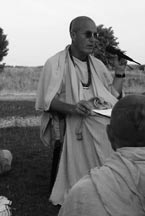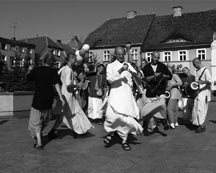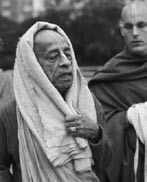By Indradyumna Swami
June 1-5, 2003
When Nandini and Radha Sakhi Vrinda visited the Mayor of Nidzica, as he had requested, he congratulated them for our three days of successful festivities. Ninety-five percent of the town was in love with Hare Krsna, he told them.
“What about the other five percent?” Radha Sakhi Vrinda asked. The mayor’s face became serious. “The priests in Nidzica were vili-fying the festival from the pulpit and going to schools to deter the children from going,” he said. “But I see our community as tolerant and open, and I encouraged the citizens. Because you gave me good publicity by entertaining the dignitaries at the castle, I am indebted to you. The next time you visit, the town will accommodate the entire festival group in our best hotel.”
Later, I thought about how things had been going better on the spring tour than I had expected. Of course, two festivals had been canceled, but we had found other venues, and the publicity generated in Nidzica was invaluable. The following evening, however, I received an email from my astrologer friend, Shyamasundara das, reminding me of a conversation we had had when I was in America. He had told me that the period from the start of June through mid-July would be difficult and I would face much opposition.
As I contemplated his email, I remembered that I had kept notes of our talk, and after a search I discovered them at the bottom of my bags. “A time of confrontation, fighting, and expending great amounts of energy to defend yourself,” they said. “Many challenges, disputes, intrigue. You will eventually win the war, but you will lose a number of battles.”
It seemed hard to believe. We were having such a wonderful tour.
But Shyamasundara’s calculations are rarely, if ever, wrong.
“Don’t think there are no crocodiles just because the water is calm.” [Malayan proverb]
I awoke with a start the next morning, bracing myself for any eventuality. I didn’t have to wait long. At 9.30 am Jayatam das came to my room as I was working at my computer and put the morning edition of the local newspaper on my desk.
“Hare Krsna Sect Poses as Cultural Event,” shrieked the headline. The front-page article went on to discredit the tour in every way imaginable, accusing us of gun-running, drug-trafficking, kidnapping of children, murder, and extortion. It didn’t have to be fact to convince the simple, farming community. As far as they are concerned, newspapers tell the truth.
Minutes later Nandini came to my room. “Srila Gurudeva,” she said, “my phone hasn’t stopped ringing. City councilors, heads of culture houses, and police from around the region are calling to question our authenticity. Two towns have canceled.”
We immediately held a tour council meeting and decided to play tough: The newspaper would have to publish an apology or face legal ac-tion.
Nandini and Radha Sakhi Vrinda went to Mlawa, one of the larger towns to cancel. The town secretary had previously been sympathetic, but now she angrily accused us of wanting to stage a festival to start a center for cultists. When Nandini and Radha Sakhi Vrinda told her the accusations were false, she said she would believe that only if she saw an apology in the newspaper.
Just a day earlier, Nandini and Radha Sakhi Vrinda had convinced the Mayor of Ilawa (the first town to cancel last week) to allow the festival to continue. As our Harinam bus headed there to advertise the revived event, the two matajis made their way from Mlawa to Ilawa for a noon appointment with the mayor in the hope of signing a contract before we started Harinam.
As we got out of the bus in Ilawa, Nandini called me from the town hall. “The mayor and the city council have agreed to the festival in principle,” she said, “but the mayor will be in a meeting for about two more hours. He said to start advertising and he’ll sign the contract as soon as he is free. It seems certain, but sometimes when we chant on the streets it attracts our opposition. Someone may even complain to the mayor before we get his signature. On the other hand, we have only two days to advertise.”
I made the decision to risk a Harinam. I was sure that the mayor’s sincerity would override any opposition.
It was a beautiful day with many people on the streets. Sri Prahlad was in top form as we chanted and danced with abandon, winding our way through lanes and alleys for two hours, distributing more than 3,000 invitations. We pasted up more than 100 posters throughout the town. We worked hard, and it was an especially hot day.
When we finished we were exhausted, especially me. At 54, I’m starting to have trouble keeping up with a five-hour Harinam six days a week. But I have to. By going out, I encourage the devotees, and when they’re inspired, the people are attracted and come to our festivals.
I got into my van and leaned back in the seat for a moment’s rest. Suddenly my phone rang. I immediately felt something was wrong. After years of sankirtan, I have a sixth sense. It was Radha Sakhi Vrinda. “The mayor refused to sign the contract,” she said. “The priests in Ilawa saw the Harinam and complained. You know how much power they exert. The mayor would lose his job if he didn’t comply.”
If we had waited just two more hours we would have had the contract in hand, but there would have been no Harinam, and with only one day left it was uncertain how many would have come without advertising. Nevertheless, I blamed myself
“War is mainly a catalogue of blunders.” [Winston Churchill]
The only consolation was the phone call Nandini received from the sheriff of Ilawa as we left town. “I’m supposed to reprimand you for pasting posters at the bus stops,” he said. “It’s not allowed. But the real reason I’m phoning is to apologize for the mayor’s decision to cancel your festival. I’m embarrassed to call myself a citizen of this town.”
Despite the heartfelt apology, the cancellation meant at least 5,000 people might not hear the holy names, taste prasadam, or read Srila Prabhupada’s books in this lifetime. Is that not a catastrophe worth publishing in the newspapers?
Everyone was silent as we proceeded to Lipno for the season’s fifth festival. To divert my mind, I picked up volume two of Sri Brhat- Bhagavatamrta. As I read the first chapter, I marveled to think that there is a world free from the turbulence of this one, and I dreamed for a moment that someday I could go there.
But then something else came to mind. “The duty of the disciple is to fulfill the mission of his spiritual master before he even thinks of go-ing back to the spiritual world,” I thought. I put the book down, and my anxiety came back as I thought about the loss in Ilawa.
When we entered Lipno an hour later, the scene before us took me by surprise and lifted my spirits. The mayor was onstage, opening the festival before a crowd of thousands.
“Ladies and gentlemen,” he said, his voice booming over the loud-speakers, “it is indeed an honor to host this great event in our town. I invite all of you to enjoy these festivities over the next two days. We have an opportunity to learn about the culture of India. I now officially open this Festival of India.”
I don’t usually cry (my heart is hard, like stone), but the roar of approval from the crowd, the sound of sweet victory so soon after defeat, brought tears even to these illusion-covered eyes of mine.
O Srila Prabhupada, surely you must share with us the pain of defeat and the happiness of victory in pushing on your mission. Please bless us with the courage to face our opposition, the intelligence to make the right decisions, and the spiritual strength to bring your message to the people. And by your grace, may we one day achieve perfection.
param gopyam api snigdhe
sisye vacyam iti srutih
tac chruyatam maha bhaga
goloka mahimadhuna
“The Vedas say that to a loyal disciple one may speak the confidential secret. Therefore, O most fortunate one, now please hear the glories of Goloka.” [Sri Brhat-Bhagavatamrta, Part Two, Chapter 1, Text 6]




